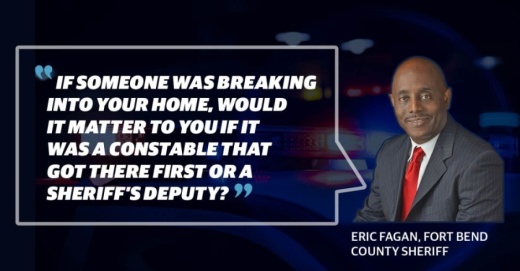For decades, Fort Bend County dispatchers answering 911 calls for unincorporated areas of the county were instructed to send the closest law enforcement official to the scene to respond, whether they be from the sheriff’s office or a constable’s office.
On Jan. 1, 2019, however, former Sheriff Troy Nehls implemented a policy change, directing dispatchers instead to send sheriff’s deputies to calls even if a constable unit was closer to the scene and was under contract to patrol a specific area.
The policy, which stayed in effect until Fagan’s reversal, caused several public disagreements among county officials, led to the formation of a committee tasked with reviewing the change in practices and even prompted a discussion about stripping the then-sheriff of his authority over the emergency response system in unincorporated areas.
In the months after his policy went into effect, Nehls said it was put in place because the sheriff’s office was considered the county’s primary public safety entity and because contract constable deputies were meant to be a supplemental service.
His explanation, however, did not alleviate concerns held by several members of the Fort Bend County Commissioners Court and the public, Precinct 3 Commissioner Andy Meyers said. The main concern, Meyers said, was that residents in an emergency would be left waiting longer than necessary for help.
Fagan said his immediate reversal of the policy has been met with positive feedback. Put simply, the new sheriff said he wanted to revert back to the old practice because a quick response from law enforcement should be a priority when an emergency occurs.
“If someone was breaking into your home, would it matter to you if it was a constable that got there first or a sheriff’s deputy?” he asked. “You just want the quickest law enforcement agency there to get to you.”
Echoing Fagan, Precinct 4 Commissioner Ken DeMerchant said he is in favor of the policy reversal.
“It makes sense to be a team and to work together,” he said.
Changes in policy
Unincorporated areas, or regions not governed by a local municipal corporation, often contract with additional law enforcement officers to increase police presence in the area, said Sgt. Matthew Hricko, a Fort Bend County Sheriff’s Office supervisor in Sienna Plantation, a master-planned community in the county.
Sheriff’s office deputies are specifically assigned to neighborhoods through a contract program in which a homeowners association or municipal utility district pays for the extra patrol. Currently, the county has 31 such contracts.
“It’s an extra service,” Hricko said. “You’re going to have quicker response times for residents in your community; that visual presence; you have more officers in the area checking the area and interacting with the schools and citizens.”
In December 2018, the sheriff’s office sent an email to all county constable offices regarding Nehls' change in dispatch policy, as Community Impact Newspaper previously reported.
“Beginning [Jan. 1, 2019] calls for service in supplemental patrol areas covered by Fort Bend County constables will be dispatched to a [sheriff’s office] patrol deputy and not the contract constable,” the email said. The message also indicated that only sheriff’s deputies would be able to close out calls for law enforcement aid.
Concerns that Nehls’ new policy could delay emergency response for residents in need came to a head at a Fort Bend County Commissioners Court meeting May 28, 2019, when Nehls said misinformation about the policy was being spread throughout the county. That misinformation, he said, essentially, was that 911 calls were no longer being answered in a timely fashion, which was placing citizens’ lives at risk.
“This could be no further from the truth,” Nehls said at the meeting.
While some agencies report a disturbance with a general broadcast, allowing any available unit to initiate a response to the call, Fort Bend County officials were directly dispatching specific units to respond, said Meghan Rivas, public communications manager of the county’s emergency operations and communications division.
Before the policy was put in place by Nehls on Jan. 1, 2019, dispatchers would directly dispatch a contract constable unit to respond to a call if the unit was in its contract area, Rivas said. No additional units would be called unless backup was needed, she said.
Under Nehls’ policy, she said, dispatchers were instructed to directly dispatch county sheriff’s units instead of contract constable units—even if the contract unit was in the area—and to use contract units only as a supplement.
Fagan’s reversal means the dispatchers have gone back to directly dispatching contract units first, she said. If a county sheriff’s unit is closer and also wants to respond, or if an additional units is needed, it is dispatched as well, Rivas said.
No matter the policy in place, Rivas said, the dispatch staff aims for the same goal: “To get service to somebody as fast as possible.”
The reversal of the policy will help dispatchers to accomplish that goal, DeMerchant said, and will allow them to provide the best possible help to residents in an emergency.
“Why not always have the closest officer answer the call?” he said. “It’s the right thing to do for the residents.”
The policy change implemented by Nehls had little, if any, effect on Sienna Plantation, Hricko said, because there are not any contract constable units in Sienna, so the closest unit has always gone to a call.
“We’re all sheriff’s deputies, so we’re all taking the reports regardless,” he said. “They're direct dispatching us right to here.”
Hricko said his team views its work as helping a family and that his deputies are glad to help in other communities when needed. For example, he said, if a call comes in for help in Riverstone, Fresno or Stafford, they help quickly and then return to their area.
“It’s not about pulling people out of everywhere; it’s, ‘Hey, you need help,’ and the closest unit goes there,” he said.
Furthermore, Hricko said he hopes the public understands that the reversal is not a bad thing.
“This is what you would want,” he said. “I mean, if some of your deputies were tied up, you wouldn’t want to wait two hours for them to get off their call to come help you; you would want another nearest deputy to come help you.”
Looking ahead
Moving forward, Fagan said he aims to continue improving the dispatch process, starting by addressing the county’s shortage in dispatchers. A study conducted before his tenure as sheriff found that the county is 30 dispatchers short, he said.
Additionally, Fagan said he wants to get EMS training for dispatchers so they are more equipped to help in emergency situations.
Mark Flathouse, Fort Bend County’s emergency management coordinator, said dispatchers are considered first responders but are often forgotten.
“They are understaffed and underpaid. ... We’ve got to protect them,” he said.
DeMerchant, too, said there is always room for improvement. In February 2020, county commissioners heard a report conducted by public safety consulting firm Fitch & Associates, which indicated that dispatch and arrival times were taking longer than they should.
The report listed several recommendations for the county to address, and with a new sheriff in office, the commissioners can begin making progress on that list, DeMerchant said.
Meyers said he and other members of the court have proposed creating a centralized emergency dispatch operation to allow all area agencies in the county, including city agencies, to join its efforts and form one regional system.
The centralized operation could help cut down on costs, he said, because the various agencies would contribute funding and, more importantly, could help streamline care for residents in emergency situations.
Meyers said he plans to pursue the idea more actively with the new administration. For now, he said, the reversal of the county’s dispatch system policy was needed. The way it runs now, he said, is common sense.
“It never made any sense to me to not send the local closest law enforcement officer to a call,” he said. “To me, it’s logical that people call 911 because they have an emergency, and you want to get law enforcement there as quickly as possible, and so you send the closest law enforcement officer. It doesn’t matter who it is.”
Ultimately, Flathouse said time is needed before reviewing the new policies and procedures Fagan puts in place. Despite changes to the dispatch practices made in the past or present, Flathouse said Fort Bend County officials share a common goal: getting the quickest, most reliable resource to an emergency as possible.
“And I think that we’re working that way,” he said.
Laura Aebi contributed to this report.





